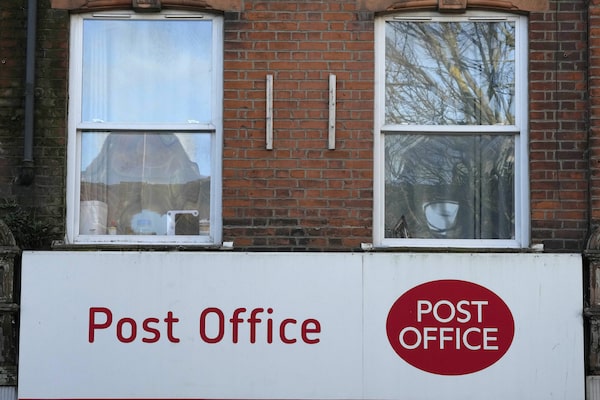
A post office logo on a shop front in London, on Jan. 16.Frank Augstein/The Associated Press
The British government introduced legislation Wednesday to quash the wrongful convictions of hundreds of Post Office branch managers in England and Wales who were caught up in one of the United Kingdom’s biggest miscarriages of justice.
Prime Minister Rishi Sunak said the legislation “marks an important step forward in finally clearing” the names of those who were convicted on the basis of a faulty computer accounting system, known as Horizon, and who have faced long delays in having their compensation claims assessed.
“We owe it to the victims of this scandal who have had their lives and livelihoods callously torn apart, to deliver the justice they’ve fought so long and hard for, and to ensure nothing like this ever happens again,” he said.
Under the terms of the bill, which is expected to become law by the summer, convictions will be automatically quashed if they meet certain conditions, including if the cases were brought by the state-owned Post Office or the Crown Prosecution Service.
The convictions must also relate to alleged offences, such as theft, fraud and false accounting, committed between 1996 and 2018, by anyone using the faulty Horizon software. More than 700 so-called subpostmasters were prosecuted by the Post Office and handed criminal convictions between 1999 and 2015.
Those with overturned convictions will receive an interim payment with the option of immediately taking a fixed and final offer of 600,000 pounds ($760,000). Those who suffered financially but weren’t convicted will be offered “enhanced” financial redress, and those who have already settled will have their compensation topped up. The option remains for claims to be assessed under the normal process in which there is no limit.
Kevin Hollinrake, the minister responsible for the affairs of the Post Office, said that he “absolutely” hoped that all compensation payments could be made by the end of the year. The total bill could run into hundreds of millions of pounds.
The Post Office and Fujitsu, the Japanese company behind Horizon, have both apologized for their roles in the scandal, which became particularly acute earlier this year after a television docudrama fuelled public outrage.
The ITV show, “Mr. Bates vs. the Post Office,” told the story of former branch manager Alan Bates, played by Toby Jones, who spent around two decades after leaving his job trying to expose the scandal and exonerate his peers.
The shock and anger prompted the government to take the extraordinary decision of bringing forward Wednesday’s legislation. Under normal circumstances, individuals would have to go through the legal process to be exonerated, but that has been a slow affair. By the end of February, only about 100 convictions had been overturned.
In 2019, a High Court ruling found the Horizon system to have “bugs, errors and defects” and that the Post Office knew there were “serious issues” about its reliability.
Many lawyers have voiced concern about the proposed legislation to quash convictions, arguing that it sets a dangerous precedent for future meddling by politicians.
“An exceptional scheme such as this can only be justified by extraordinary circumstances,” said Nick Emmerson, president of The Law Society, which represents solicitors in England and Wales.
“It cannot be treated as a precedent or justify further government intervention in the independence of our justice system,” he added.
Hollinrake conceded that the legislation will overturn the convictions of some people who are guilty.
“However, we believe this is a price worth paying to ensure that many innocent people are exonerated,” he added.
An official inquiry is ongoing.